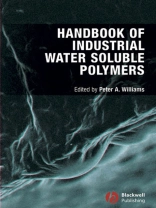Natural and synthetic water soluble polymers are used in a wide
range of familiar industrial and consumer products, including
coatings and inks, papers, adhesives, cosmetics and personal care
products. They perform a variety of functions without which these
products would be significantly more expensive, less effective or
both.
Written for research, development and formulation chemists,
technologists and engineers at graduate level and beyond in the
fine and specialty chemicals, polymers, food and pharmaceutical
industries, the Handbook of Industrial Water Soluble
Polymers deals specifically with the functional properties of
both natural and synthetic water soluble polymers. By taking a
function based approach, rather than a ‘polymer
specific’ approach the book illustrates how polymer structure
leads to effect, and shows how different polymer types can be
employed to achieve appropriate product properties.
Tabla de materias
1 Introduction.
2 Natural thickeners.
3 Acrylic polymers as rheology modifiers for water-based
solutions.
4 Gelling agents.
5 Emulsification and encapsulation.
6 Polymeric flocculants.
7 Polymer micelles: amphiphilic block and graft copolymers as
polymeric surfactants.
8 Applications of water soluble dendrimers.
9 Preparation, properties and applications of colloidal
microgels.
10 Industrial water soluble polymers in packaging
Sobre el autor
Peter Williams is Professor of Polymer and Colloid Chemistry
and Director of the Centre for Water Soluble Polymers at the North
East Wales Institute of Higher Education, Wrexham, UK
Contributors:
Dr G. Sworn
Dr M. Hawe
Dr D.J. Mc Clements
Dr Gill Moody
Dr G. Riess
Dr Wayne Hayes
Dr Philip Woodward
Dr Steve Rannard
Professor M.J. Snowden
Dr Louise Garcia
Professor P.A. Fowler
Dr Radek Messias de Braganca











